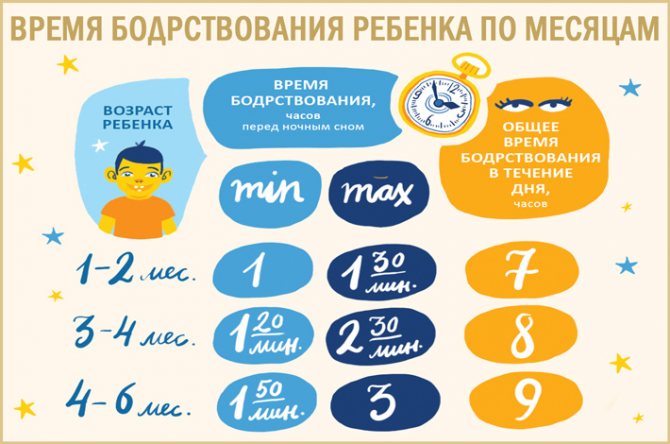Richard Ferber is considered the most authoritative expert on children's sleep. Yes, one can argue with him about his sleeping methods—Ferber is a supporter of babies falling asleep on their own—but his immersion in the topic of sleep, meticulousness and meticulousness inspires respect. If you don’t know how much a child should sleep at 6 months or at one and a half years, when to switch to one nap during the day and how to do it, this is the place for you.
All children sleep during the day, at least until a certain age. When I hear parents say that their child “never took a nap,” I assume that the child had difficulty falling asleep, slept little or always at different times, or could not be put down properly for a “normal” quiet hour. But so that he never sleeps during daylight hours? This is impossible. The same parents invariably admit: yes, he did sleep, but “only in the car,” “only in the stroller on the way back from the playground,” or “not at home, but always in the nursery.”
In a newborn, periods of sleep and wakefulness have different durations and are scattered throughout the day. By the age of three months, he should already clearly distinguish between day and night. The majority of sleep occurs at night, and the day is built according to an increasingly stable pattern of periods when he sleeps and when he is awake. At three to four months, a child is entitled to three naps during the day: long ones in the middle of the first and second half of the day and a short one in the evening. At about six months of age, evening sleep usually disappears.
Most babies give up one of their two remaining naps around their first birthday or in the coming months. For some, this refusal occurs immediately, but for most it lasts for a period of several weeks, when one daytime nap or another is missed.
And more often than not, the baby not only refuses one of the dreams - he develops a new daytime dream instead of the two former ones in between. For example, if a child falls asleep at 10:00 am and at 2:00 pm, you can expect one afternoon nap to occur in the afternoon. From this point on, it often becomes easier to get your baby down for both evening and afternoon naps, since he is now awake longer in between.
In due time, the last daytime sleep will disappear, but when exactly is difficult to predict. For most children, this happens in the fourth year of life, but it happens at two years of age - or does not happen until kindergarten.
Let's look at the main problems with a child's daytime sleep.
Much at night and little during the day
Most often, a child who has difficulty falling asleep during the day sleeps well at night for 11 hours or more. During the day you can hardly force him to take a nap, and if he does fall asleep, it will be for a maximum of half an hour.
If this is your case, your baby's sleep needs may be met entirely during the night. Most children who need the same amount of sleep as you sleep less at night (say, 9.5 hours) and longer during the day (having one two-hour nap or two one-hour naps). But your baby sleeps so well during the night that he doesn't feel drowsy during the day.
If short naps are the only “problem,” calm down and leave it at that. But often in this mode, children become lethargic and capricious, even getting enough sleep at night. They are not so sleepy that they can sleep normally during the day, but they are not so alert that they feel and behave well. Another reason to change this mode may be inconvenience or problems with going to bed even for a short nap during the day.
In this case, you will have to reduce the child’s nighttime sleep. Try to reduce it by 30-60 minutes, or even two hours if necessary, but no more, since giving the child less than nine hours of sleep at night is impractical. This can be done all at once or gradually over several days, or by going to bed later, rising earlier, or a combination of both. Don't worry if you cut your baby's nights too short at first to get results—you can always adjust back later. Remember: your task is not to take away part of your child’s sleep, but to transfer it from night hours to daytime hours.
The benefits of daytime rest for a baby
Daytime naps help babies focus better, find interesting activities, and generally be more independent.
Contrary to popular belief, daytime sleep in infancy does not negatively affect the quality of nighttime sleep. Moreover, poor daytime and night sleep in infants often has the same reason: overexcitation of the nervous system.
It is in a dream that a child’s full development occurs, therefore, if he is deprived of rest, the baby will develop more slowly. In some cases, daytime sleep can negatively affect the quality of nighttime sleep if, for example, the child falls asleep late in the evening. It all depends on the age of the baby. Newborns sleep almost all the time.
Much during the day and little at night
When a child sleeps too much during the day, parents fear that something is wrong with him. Even if this is comfortable for you, sleeping too little at night may be a problem. You suspect that, without getting enough sleep at night, the baby “gets his way” during daylight hours. Most likely, the opposite is true: excessive daytime sleep interferes with nighttime sleep.
For example, parents say that a baby or toddler aged one to two years sleeps only 6.5-7 hours at night. Most often it turns out that the duration of his daytime sleep in total reaches 4-6 hours, which is a lot. Even with four hours of sleep during the day, daily sleep in total will be 10.5–11 hours. With six hours of daytime sleep, parents are very lucky if their child sleeps seven hours at night.
Perhaps this schedule suits you. However, it is not suitable for a child. Almost no one needs more than two hours of nap time at a time. Starting from three to four months of age, most children who sleep more than once during the day spend a total of three to four hours sleeping during daylight hours.
The solution is simple: take away some of your baby's daytime sleep so that he has to compensate for the lack of sleep at night. If your baby has too many naps for his age (say, three at 10 months or two at 18 months), you should eliminate one or even two.
If the quantity is normal, but the duration is excessive, each daytime nap can be gradually reduced. For example, cut a single four-hour nap by 15 to 30 minutes each day until it lasts two hours. Two three-hour sleeps can be reduced in the same way until each is limited to two, or maybe one and a half hours, if it is more convenient for you and the child.
Do not let your baby sleep at other times of the day until he is completely accustomed to the new routine. For a week or two, it makes sense to avoid unnecessary travel with your child by car. If a nanny sits with him during the day, demand that she not allow too much napping during the day. The more the child sleeps during the day, the easier it is for the nanny, so the temptation is obvious.

Norm for six-month-old children
It is worth considering that a month-old baby and a six-month-old baby need different amounts of sleep per day.
With age, the period of wakefulness of children increases, and the period of rest decreases. At six months of age, babies should sleep a total of 12-14 hours a day. Daytime sleep is allotted twice for 40-60 minutes, and at night the baby can sleep for 7 hours in a row. However, these are only average, one might even say “idealized” data. In reality, everything happens completely differently. A 6-month-old child sleeps poorly and sleeps little at night if he is bothered by any problems. It is worth considering that “bad sleep” does not consist of a deviation from the norm for 10-20 minutes, but of the baby constantly waking up at night, difficulty falling asleep, irritability and moodiness.
If children sleep 1-2 hours less than expected, but are steadily gaining weight and do not have any diseases, there is no need to panic.
Short day and night sleep
Your baby may have an unusually low need for sleep. He gets enough sleep at night even eight to nine hours in advance and doesn’t feel much desire to sleep during the day. But keep in mind that this is rare. If this is really your case, and you do not want to shorten your child’s night sleep in order to force him to sleep during the day, all that remains is to come to terms with the situation - a short night sleep and a short or not every day day sleep - in the hope that with the final refusal of daytime sleep at least night will lengthen a little.
On the other hand, if a child, having given up daytime rest too early, becomes capricious, irritable, or experiences other difficulties, you have no choice but to carve out a quiet hour for him at the expense of night sleep, at least until he won't feel normal all day.
How long does a 6 month old baby stay awake and sleep?
A baby's sleep at 6 months is not much different in duration from the sleep of a newborn. He sleeps between 13.5 and 16 hours a day. At the same time, he goes to bed 2-3 times during the day, and not 4 times, as before. At night the baby sleeps 10-12 hours, during the day - 3.5-4 hours. The period of complete transition to 2 naps a day can take up to 8 months.

Between bedtime, the baby has time to eat and play. Every day the period of wakefulness increases, as the baby develops rapidly, opportunities, skills and tasks change. Even during sleep, he may exhibit motor activity, which leads to constant anxiety and restless sleep.
Long day and night sleep
If a child sleeps 10-11 hours at night, despite three or more hours of total sleep during the day, it is obvious that there is no need to reduce his daytime sleep. There are sleepyheads among children (this is partly a hereditary trait). Another thing is abnormally long sleep after the first months of life, when the child spends 15 or more hours out of 24 sleeping. This is a reason to consult a doctor. Some neurological and metabolic disorders that lead to extreme sleepiness may appear as early as infancy.
Do not forget that the appearance of too much sleep in a child can be deceiving. If he lies quietly in his room for 11-13 hours, it does not follow that he is sleeping all this time. In fact, many such children are awake for periods of up to an hour during the night, and the total duration of their sleep is normal. They play quietly until they fall asleep again and don't need anything else.
To find out the truth, check in with your child several times during the night to see if he is sleeping. You could instead shorten his naps during the day or keep him in bed less from evening to morning and see what happens. If after a few weeks you find that he is lethargic and unhappy during the day, and in the morning or after a nap he has to be picked up because he does not wake up on his own, then he has a really high need for sleep.
6 month old baby has trouble sleeping: what's going on?
Insomnia occurs under the influence of irritants. If at 6 months the child begins to sleep poorly, the reason may be a failure in the growth of new teeth, a reaction to an expansion of the diet, nervous overexcitation, or illness.
With regular lack of sleep, complications begin to develop:
- the degree of assimilation of new information decreases;
- memory and concentration deteriorate;
- the development of the psyche and speech is inhibited;
- metabolic processes are disrupted;
- losing or gaining weight;
- psycho-emotional disturbances appear;
- the likelihood of developing diseases increases.
Due to lack of sleep, the child becomes irritable and restless. Timely measures taken will help you avoid the consequences of poor rest. Parents should monitor the situation. If sleep problems recur every day, you need to try to find the trigger for insomnia.
Attention! You should not hesitate to identify disturbing symptoms characteristic of somatic diseases. The doctor will have to look for the cause of the failure and draw up a treatment plan, focusing on the diagnostic results.
Sleep norms in the first half of the year
At the age of six months, a total of about 14 hours of sleep is spent on sleep. The time of day and night rest is added up.
The baby can nap 2-3 times during the day:
- In the morning, 2-3 hours after a night's sleep.
- At lunch.
- In the evening 2-3 hours before night rest.
In total, about 4 hours are spent on daytime sleep. The last quiet hour should not exceed 60 minutes. Otherwise, the baby will be capricious for a long time, spin around and try to sleep. A night's rest takes no more than 9-10 hours.
Signs of a sleep disorder
Insomnia is manifested by taking a long time to fall asleep, drowsiness during the day and regular awakenings screaming and crying due to unpleasant dreams. Other symptoms depend on the type of disorder. Child 6 months does not sleep well at night due to the following abnormalities:
| Sleep Disorder Options | Description |
| Long periods of falling asleep and constant awakenings | The child tosses and turns for a long time, trying to fall asleep, often wakes up and begins to scream and cry. |
| Failures of daily biorhythms | The baby falls asleep late or early. Due to the resulting malfunction, drowsiness appears during the daytime. |
| Sleep apnea | The baby snores loudly and periodically stops breathing for several seconds. Inadequate rest provokes the appearance of symptoms of lack of sleep and upset mood after waking up. |
| Nightmares | The child twitches, often wakes up and begins to scream and roar. Getting back to sleep is usually difficult. |
| Violation of rhythmic movements | The baby makes chaotic movements during sleep. The problem appears in infancy and almost always ceases to be an issue by age 4. |
Factors that disturb the child's peace
Somnologists claim that with an 80% probability, insomnia in six-month-old children manifests itself due to physiological factors.
The problem lies in the presence of external stimuli, a fragile psyche, high muscle tone and other nuances. In other cases, we are talking about a pathological deviation. You can see why a 6 month old baby sleeps poorly at night in the table:
| Groups of factors for the development of insomnia | Signs |
| An emotional trigger for sleep disorders in childhood can be any picture seen or information heard. Even during a walk, a six-month-old child receives a lot of emotions. As a result, long periods of going to bed and frequent awakenings become a consequence of excessive stimulation of the nervous system. | • Nightmarish dreams accompanied by abrupt awakening, screaming and whimpering. • Long time falling asleep. • Light sleep. • Disturbance of daily biorhythms. |
| Somatic factors are bodily pathologies not related to the psyche. Each disease has its own clinical picture. The symptoms that appear prevent the child from getting proper sleep, which leads to a worsening of the condition. | • Discomfort caused by increased gas formation. • Manifestation of signs of rickets. • Consequences of gaining excess body weight. • Increase in temperature against the background of the development of other pathological processes. • Complications caused by high intracranial pressure. • Unpleasant sensation due to teething. |
| Neurological diseases sometimes appear even in infants. Due to a large number of disturbing symptoms, the baby cannot sleep or constantly wakes up. | • Anxious sleep. • Tremor of the limbs. • Skin paleness. • Lack of appetite. • Slow development. • Increase or decrease in muscle tone. • Unreasonable outbursts of emotions. |

It is important to know! Somatic and neurological factors pose a danger. The child needs to be shown to a pediatrician to draw up a treatment regimen or be referred to a more specialized specialist. The consequences of nervous overexcitation or the influence of external stimuli can be eliminated independently, using available methods and advice from somnologists.
Daytime nap
It is impossible to unequivocally answer the question of how long a baby needs to rest during the day at six months of age. Boys do not differ from girls in terms of sleep duration. Girls just go to bed faster.
Sometimes the six-month mark becomes a transition point and children switch to two naps a day. The transition occurs in this way: it is impossible to put the baby to rest in the evening, but a tired little one goes to bed earlier for the night. Morning rest is shifted. There is a transition to two naps a day.

Some babies continue to sleep three times a day at 6 months
Distribution of children's daytime sleep
The total duration of daytime sleep for a six-month-old toddler is 5-6 hours. If the baby sleeps three times a day, then the division occurs as follows: in the morning - 1.5 hours, in the afternoon - 2-2.5; in the evening – 1.5. Children who have switched to a two-day rest period sleep longer: in the morning they rest for 2 to 2.5 hours and in the evening for 3 hours. The duration of sleep on a street walk is longer than at home.
Why does a child sweat a lot while sleeping?
Mostly young children wake up at 6 am, sometimes sleep up to seven hours. Waking up early is understandable. The baby is hungry, he demands to change his diaper after the night.
Then, in a great mood, the baby is ready to play and be with his parents. After 2-3 hours the baby already wants to rest. In the morning he sleeps from 9.00 to 9.30 for 1.5 hours.
During the following waking moments, games and activities are held. Development activities take a lot of time and attention. You can even do housework with your baby. During the day, you can go outside with your baby, thereby increasing the duration of daytime sleep to 2.5–3 hours. In the fresh air, in a stroller, the baby will sleep from 12.00 to 15.00.
In the evening, the kids rest for a short time. Falling asleep occurs at approximately 18.00. After resting for an hour and a half, the child becomes active again and is ready to take evening procedures. You can spend 30–40 minutes of evening wakefulness on a street walk. After taking a bath, receiving an evening massage, and eating a hearty meal, the baby falls into a deep night's sleep.
No ads 2











